Search
Did you mean: Mari?
Search Results

Definition
Saguntum
Saguntum (modern Sagunto), located near Valencia in Spain, was an Iberian, and then Roman, settlement. The town's most dramatic moment in history came in the late 3rd century BCE when it was attacked by Hannibal, an act which famously sparked...
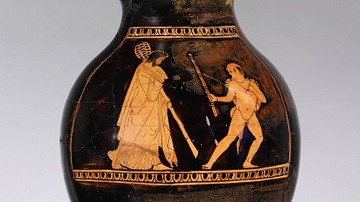
Definition
The Anthesteria
The Anthesteria celebrated two seemingly disparate things: wine and the dead. Both Dionysos and Hermes Chthonios (Hermes of the Underworld) were celebrated as part of this festival. In many ways, the Anthesteria is similar to our modern Halloween...

Definition
Leo III
Leo III was emperor of the Byzantine Empire from 717 to 741 CE. He founded the Isaurian dynasty which ruled until 802 CE. The emperor was a talented administrator, and he revamped the empire's political apparatus and legal code. Leo's reign...

Definition
Pertinax
Pertinax was Roman Emperor for three months in 193 CE and, as successor to Commodus, it was hoped that he would restore much needed sobriety to the office of emperor. However, the former teacher, as well as putting in order the affairs of...
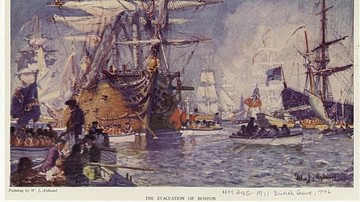
Image
British Evacuation of Boston, 1776
The British evacuate Boston in March 1776, after the Siege of Boston (19 April 1775 to 17 March 1776), in the opening phase of the American Revolutionary War (1775-1783). Image by William James Aylward, 1911.
New York Public Library.
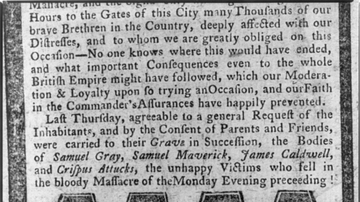
Image
Four Coffins of the Victims of the Boston Massacre
A newspaper clipping from the Boston Gazette reporting on the funeral of four of the victims of the Boston Massacre, represented by an image of four coffins, each bearing the initials of a victim. These names from left to right include: Samuel...

Image
Siege of Maastricht, 1793
Siege of Maastricht by a French Republican army under General Miranda, February-March 1793 during the War of the First Coalition. The siege was abandoned at the approach of an Austrian army, leading to the Battle of Neerwinden on 18 March...

Image
Page 1 of the Articles of Confederation
The first page of the Articles of Confederation, the first framework of the United States government, in effect from March 1781 to March 1789.
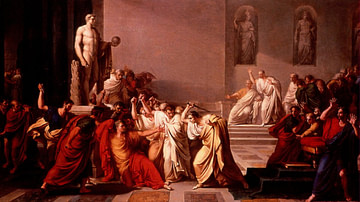
Article
The Assassination of Julius Caesar
Veni, vidi, vici! This was the simple message the Roman commander Julius Caesar sent to the Senate in Rome after a resounding victory in the east against King Pharnaces of Pontus - a message that demonstrated both arrogance as well as great...
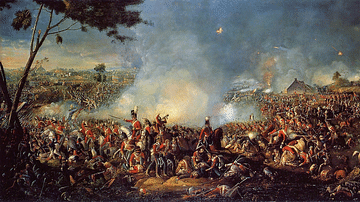
Article
Battle of Waterloo
The Battle of Waterloo (18 June 1815) was the last major engagement of the Napoleonic Wars (1803-1815), fought by a French army under Emperor Napoleon I (r. 1804-1814; 1815) against two armies of the Seventh Coalition. Waterloo resulted in...